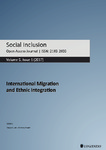The Design of Migrant Integration Policies in Spain: Discourses and Social Actors

Use this link to cite
http://hdl.handle.net/2183/18346Collections
- Investigación (FSOC) [415]
Metadata
Show full item recordTitle
The Design of Migrant Integration Policies in Spain: Discourses and Social ActorsAuthor(s)
Date
2017-03-28Citation
Fernández Suárez, B. (2017). The Design of Migrant Integration Policies in Spain: Discourses and Social Actors. Social Inclusion, 5(1), p.117.
Abstract
[Abstract]: Spain is one of the countries with the lowest social spending within the EU-15, and its welfare state has developed later and with less intensity. At the end of the 20th century, Spain became an immigration country, reaching 5.7 million immigrants in 2011. This article explores how the definition of migrant ‘integration’ is based more on a concept of universal rights and social cohesion by the main actors (political parties, trade unions, third sector organizations and immigrant associations) than on a notion of a cultural type. We will also analyze how the influence of European policies and restrictive liberalism have led to the implementation of programmes which aim to make civic integration compulsory for the renewal of residence and work permits. The empirical evidence for this article stems from 60 qualitative interviews with social actors in migrant integration policies during 2010 and 2011. The impact of the economic crisis on the foreign population, especially regarding its position in the labor market, will also be considered, explaining the reduction of specific and general policies targeting the migrant population. This cut in social spending has involved a deinstitutionalization of this particular policy field
Keywords
Actors
Culture
Discourse
Immigration
Institutionalization
Integration
Policies
Political parties
Spain
Culture
Discourse
Immigration
Institutionalization
Integration
Policies
Political parties
Spain
Editor version
Rights
Atribución 4.0 Internacional
ISSN
2183–2803






